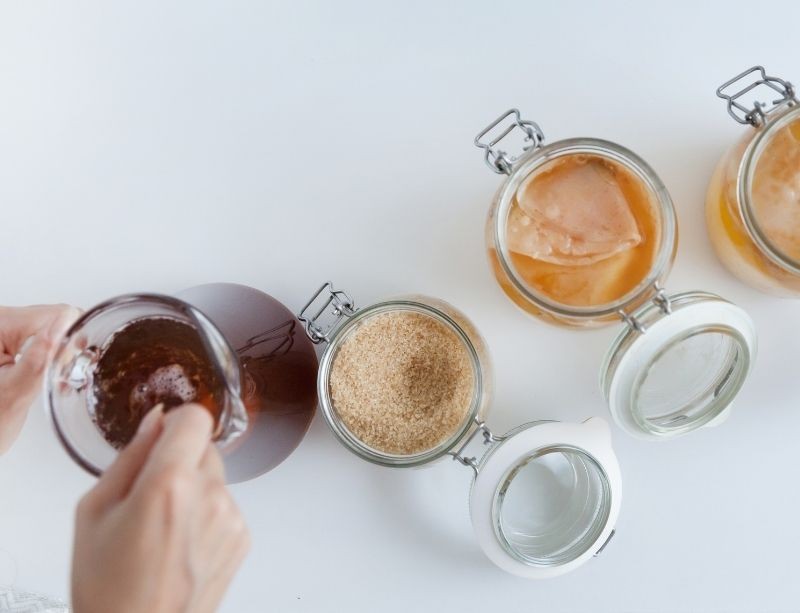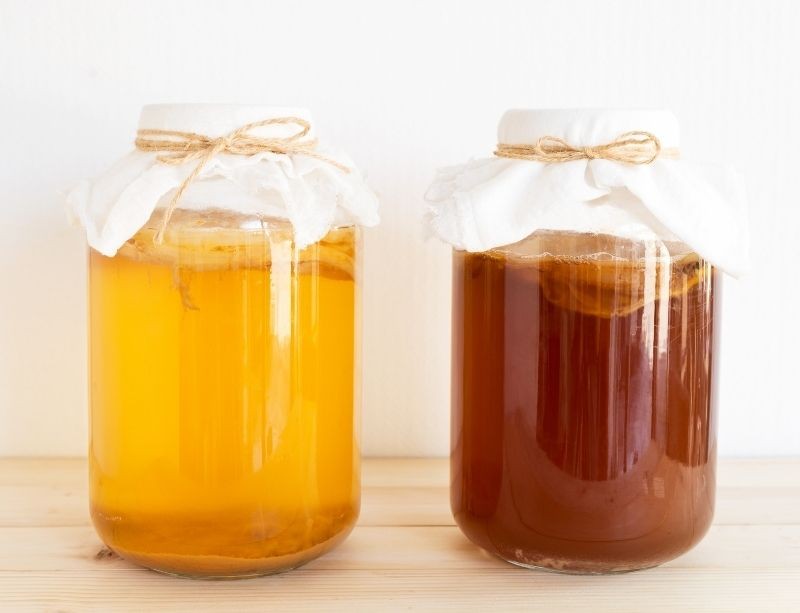How much alcohol is in kombucha is a common question, and understanding the alcohol level in this fermented beverage is essential. At HOW.EDU.VN, we provide expert insights into kombucha’s alcohol content, addressing concerns and clarifying misconceptions. Discover the factors influencing alcohol levels in kombucha, including fermentation time, sugar content, and yeast activity.
1. Understanding Alcohol Content in Homemade Kombucha
Homemade kombucha typically contains a low level of alcohol, generally ranging between 1% and 2.5%. This is a natural result of the fermentation process, where yeast consumes sugars and produces alcohol.
Commercial kombucha, on the other hand, is often regulated to have an alcohol content of less than 0.5% to be classified as a non-alcoholic beverage. This difference in alcohol content is due to variations in the brewing process and regulatory standards.
2. The Science Behind Kombucha’s Alcohol Production
Kombucha’s alcohol content is a direct result of its fermentation process.
Fermentation relies on the symbiotic culture of bacteria and yeast (SCOBY). The yeast consumes sugars in the sweetened tea, producing carbon dioxide (CO2) and alcohol. Subsequently, bacteria convert the alcohol into acetic acid, which gives kombucha its characteristic tangy flavor.
This natural process makes it challenging to determine the exact alcohol content of each batch without specialized equipment. Standard tools like hydrometers may not provide accurate readings due to the numerous particles in suspension.
3. Key Factors Influencing Kombucha Alcohol Levels
Several factors can influence the alcohol content of kombucha, impacting the final product.
3.1. Sugar Content
The initial amount of sugar directly affects the potential alcohol production. The more sugar available for the yeast to consume, the higher the alcohol content can be.
However, there’s a limit to how much sugar yeast can ferment. Kombucha’s unique mixed fermentation, where bacteria consume alcohol to produce vinegar, ultimately reduces the final alcohol level.
3.2. Yeast Variety
Kombucha fermentation is a wild fermentation, meaning it’s influenced by the quality, quantity, and types of yeast present in the SCOBY. A richer yeast culture can lead to higher alcohol content.
Since kombucha fermentation is open-air, wild yeasts from the environment can also play a role. These yeasts vary from one environment to another, making it difficult to predict their influence on the final alcohol content.
3.3. Fermentation Temperature
The ambient temperature during fermentation significantly impacts alcohol levels. Yeast is more active at warmer temperatures, leading to increased sugar consumption and alcohol production.
Interestingly, bacteria in kombucha prefer cooler temperatures. Manipulating the fermentation temperature allows brewers to control both the alcohol and acidity levels. Higher temperatures favor alcohol production, while lower temperatures favor acidity.
3.4. Fermentation Duration
During the initial phase of fermentation, yeast multiplies rapidly, producing a significant amount of alcohol and carbon dioxide. This phase typically lasts about a week.
As fermentation progresses, bacteria become more active, converting alcohol into acetic acid. Longer fermentation times result in kombucha with a lower alcohol content and a tangier taste.
3.5. Air Exposure
Acetic bacteria require oxygen to convert alcohol into vinegar. The more contact kombucha has with air, the more alcohol is converted into acetic acid, lowering the alcohol content.
Containers with wide openings and well-ventilated environments promote better air exchange, leading to reduced alcohol levels.
4. How to Brew Low-Alcohol Kombucha at Home
Brewing homemade kombucha with a very low alcohol content is achievable with careful control over the brewing process.
To reduce alcohol content:
- Limit added sugar to 50g (¼ cup) per liter.
- Maintain a fermentation temperature between 20 and 28°C.
- Extend fermentation time from 10 to 15 days.
- Avoid adding sweet ingredients during flavoring.
- Limit bottle fermentation time before refrigeration.
For a more radical approach, consider brewing sugar-free kombucha by allowing it to ferment for an extended period, as detailed in our sugar-free kombucha recipe or kombucha vinegar recipe.
5. Strategies for Brewing High-Alcohol Kombucha
Creating kombucha with a higher alcohol content requires promoting yeast growth while limiting acetic acid bacteria activity.
To increase alcohol content:
- Increase added sugar to 100g (½ cup) per liter.
- Maintain a fermentation temperature between 28 and 35°C.
- Reduce fermentation time from 7 to 10 days.
- Add sweet ingredients during flavoring.
- Keep bottles at a temperature between 25 and 35°C before refrigeration.
For a simple and effective method, refer to our hard kombucha recipe. Another technique involves limiting oxygen exposure by transferring the kombucha to a carboy with an airlock after 5 days of fermentation.
6. Essential Tools for Kombucha Brewing
Having the right tools can significantly enhance your kombucha brewing experience. We recommend the following products:
| Product | Description |
|---|---|
| Kombucha Brewing Kit | Includes essential equipment for brewing kombucha at home. |
| Mamma Kombucha (Kombucha SCOBY) | Provides the necessary culture for fermenting kombucha. |
| 1 Gallon Glass Carboy Fermenter | Used for secondary fermentation to limit oxygen exposure and increase alcohol. |


7. Maximizing Expertise with HOW.EDU.VN’s Expert Team
At HOW.EDU.VN, we connect you with over 100 renowned Ph.D. experts ready to address your unique challenges and provide tailored solutions. Navigating the complexities of kombucha brewing and optimizing alcohol content can be challenging, but our experts offer invaluable insights and guidance.
Imagine gaining clarity on the nuances of fermentation or receiving personalized strategies to achieve your desired alcohol levels. Our Ph.D. experts offer unparalleled assistance, saving you time and resources.
8. The Value of Expert Consultation in Kombucha Brewing
Consulting with our Ph.D. experts ensures you receive the most reliable and effective strategies, enhancing your brewing outcomes and minimizing potential pitfalls.
Benefits include:
- Personalized Advice: Receive tailored guidance to address your specific brewing challenges.
- In-Depth Knowledge: Leverage the expertise of professionals with extensive experience in fermentation and brewing.
- Effective Solutions: Implement strategies that deliver tangible results, optimizing alcohol content and flavor profiles.
9. Real-World Success Stories
Consider the story of Sarah, a home brewer who struggled to achieve consistent alcohol levels in her kombucha. After consulting with a HOW.EDU.VN expert, she implemented precise temperature control and adjusted fermentation times, resulting in kombucha with the desired alcohol content and flavor profile.
Another example is Mark, who needed to optimize his kombucha recipe for commercial production. With the guidance of our Ph.D. experts, he refined his process, ensuring compliance with regulatory standards and producing a consistent, high-quality product.
10. The AIDA Framework in Action
- Attention: Interested in mastering kombucha brewing?
- Interest: Discover how our Ph.D. experts can transform your brewing experience.
- Desire: Envision achieving consistent, high-quality kombucha with expert guidance.
- Action: Contact us today to connect with our Ph.D. experts and elevate your kombucha brewing!
11. Transform Your Kombucha Brewing Today
Take the next step by connecting with our Ph.D. experts at HOW.EDU.VN. Whether you’re aiming to fine-tune your brewing process, troubleshoot issues, or scale up production, our experts provide the support you need to achieve success.
12. The Advantages of Choosing HOW.EDU.VN
Choosing HOW.EDU.VN means accessing a network of over 100 Ph.D. experts, tailored solutions, and personalized support. Our platform ensures you receive the highest quality guidance, empowering you to achieve your brewing goals efficiently and effectively.
- Expert Network: Access a diverse range of Ph.D. experts with specialized knowledge.
- Tailored Solutions: Receive personalized advice and strategies for your specific needs.
- Personalized Support: Benefit from ongoing support and guidance throughout your brewing journey.
- Time and Cost Savings: Reduce trial and error, saving time and resources with expert insights.
- Enhanced Outcomes: Achieve consistent, high-quality kombucha with optimal alcohol content and flavor.
13. Addressing Key Challenges in Kombucha Brewing
Many brewers face challenges in controlling alcohol levels and maintaining consistent flavor profiles. Our Ph.D. experts address these challenges by providing targeted solutions and personalized support.
- Alcohol Level Control: Accurate methods to monitor and adjust alcohol content.
- Flavor Consistency: Strategies for maintaining consistent flavor profiles batch after batch.
- Troubleshooting Issues: Expert advice on resolving common brewing problems.
- Scaling Production: Guidance on scaling up production while maintaining quality and consistency.
14. Why Seek Expert Guidance?
Navigating the complexities of kombucha brewing requires specialized knowledge and experience. Our Ph.D. experts offer insights that can transform your brewing outcomes, ensuring you achieve optimal results.
- Specialized Knowledge: Access expertise in fermentation, microbiology, and brewing science.
- Practical Experience: Benefit from years of hands-on experience in brewing and troubleshooting.
- Innovative Solutions: Discover cutting-edge techniques for optimizing your brewing process.
- Risk Mitigation: Minimize potential pitfalls with expert guidance and support.
15. FAQs About Alcohol in Kombucha
15.1. Is kombucha alcoholic?
Kombucha can contain alcohol as a natural byproduct of fermentation. However, commercial kombucha is often regulated to have less than 0.5% alcohol to be considered non-alcoholic.
15.2. Can kombucha make you drunk?
It is unlikely that kombucha will make you drunk due to its low alcohol content. However, homemade kombucha can have a higher alcohol content, so it is important to be aware of the potential effects.
15.3. How can I measure the alcohol content in my homemade kombucha?
Measuring the alcohol content in homemade kombucha requires specialized equipment, such as a hydrometer. However, these tools may not provide accurate readings due to the particles in suspension.
15.4. How can I lower the alcohol content in my kombucha?
To lower the alcohol content in your kombucha, limit added sugar, maintain a lower fermentation temperature, extend fermentation time, avoid adding sweet ingredients during flavoring, and limit bottle fermentation time before refrigeration.
15.5. What factors influence the alcohol content of kombucha?
The main factors influencing the alcohol content of kombucha include sugar content, yeast variety, fermentation temperature, fermentation duration, and air exposure.
15.6. Is it safe for children to drink kombucha?
Due to its alcohol content, it is generally not recommended for children to drink kombucha.
15.7. Can pregnant women drink kombucha?
Pregnant women should consult with their healthcare provider before consuming kombucha due to its alcohol content and potential effects.
15.8. Does kombucha have any health benefits?
Kombucha is often touted for its potential health benefits, including probiotic support and antioxidant properties. However, more research is needed to confirm these benefits.
15.9. How does the fermentation process affect the alcohol content?
The fermentation process directly affects the alcohol content as yeast consumes sugar and produces alcohol. Bacteria then convert the alcohol into acetic acid, reducing the final alcohol level.
15.10. What are the legal regulations regarding alcohol content in kombucha?
Legal regulations vary by country, but commercial kombucha is often required to have less than 0.5% alcohol to be classified as non-alcoholic.
16. Ready to Get Started?
Elevate your kombucha brewing with insights from our Ph.D. experts at HOW.EDU.VN.
Contact Us Today:
- Address: 456 Expertise Plaza, Consult City, CA 90210, United States
- WhatsApp: +1 (310) 555-1212
- Website: HOW.EDU.VN
Consult with Ph.D. experts at HOW.EDU.VN to optimize your kombucha brewing process.
17. Success Awaits You
Imagine the satisfaction of consistently brewing perfect kombucha with optimal alcohol content and flavor. Our Ph.D. experts are ready to guide you every step of the way, ensuring you achieve your brewing goals efficiently and effectively.
18. Don’t Miss Out
Don’t let brewing challenges hold you back. Contact how.edu.vn today and start your journey toward brewing excellence with our team of renowned Ph.D. experts. Your brewing success is just a consultation away.